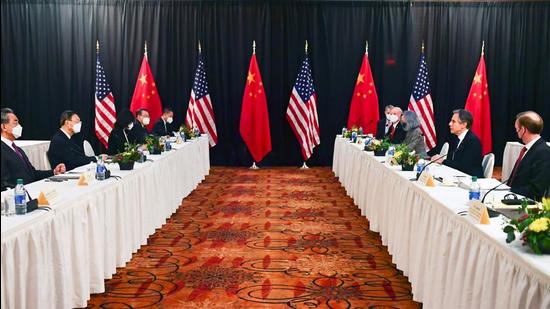Tracing the roots of the US-China discord
Washington believes Beijing is defying and rejecting the international rules-based order. Beijing believes it has been responsible but the US wants to contain its rise
Last month, the Joe Biden administration held high-level talks with the Chinese government in Alaska. It did not take long for the talks to descend into acrimony. China’s director of the central foreign affairs commission of the Chinese Communist Party (CCP), Yang Jiechi, lost no time in condemning the United States (US) government on a variety of issues — from its problems with racism and the Black Lives Matter movement to undermining stability around the world and meddling in China’s affairs in particular. The response was triggered by US secretary of state Antony Blinken calling out China for its crackdowns in Hong Kong and Xinjiang province, its increasing cyberattacks, and for “threatening the rules-based order that maintains global stability.”

The tone reflected sharply, and unusually publicly, the rapidly deteriorating state of US-China relations over the past few years. This downward turn in the relationship could not necessarily have been predicted a couple of decades ago. Rather, it is an outcome of failed expectations, and subsequent frustration on both sides.
Today, in the US, there is a widely-held perception that it tried a policy of engagement with China, and this policy was an abject failure. The policy of engagement, whose roots can be traced to President Richard Nixon’s visit to China in the 1970s, was based on bringing China into the US-led liberal international order. Thus, Deng Xiaoping’s economic reforms of the 1980s and 1990s gave hope to American officials that China, by opening its economy, would deeply integrate into the liberal multilateral order. Getting China to embrace free trade, join numerous international institutions, and follow “the rules-based order” would, the US believed, not only perpetuate the primacy of the liberal order but also quite possibly lead to political reform within China. In the most ideal scenario, China would democratise, but failing that, it would at least liberalise its society.
The events of Tiananmen Square slightly dented such rosy visions. Other crises — such as the 1996 Taiwan Straits crisis (which demonstrated, to the shock of the US, the level of China’s commitment to Taiwan), and the 1999 accidental North Atlantic Treaty Organization (NATO) bombing of the Chinese Embassy in Belgrade (which led to widespread anti-US riots in China) — combined with the fact that the CCP showed no signs of losing its authoritarian grip on Chinese politics and society, eventually led to US disenchantment with the engagement policy.
By the 2000s, as China’s military build-up increased, and it became the US’s largest foreign creditor, the US was seeing it as a bone fide threat. In 2018, Aaron Friedberg, Princeton professor and former aide to vice-president Dick Cheney, testified before the US Congress that, “China is now quite clearly a revisionist power. It seeks to change important aspects of the existing order in Asia and increasingly the wider world, as well.”
China, meanwhile, began responding to the US in the 1980s and 1990s by adopting Deng Xiaoping’s famous maxim of taoguang yanghui (hide one’s strength and bide one’s time). In doing so, in China’s view, it not only took steps to respond to and engage with the US but it also integrated into the international order — not by adopting American liberal ideologies perhaps, but certainly by engaging with the pieces of it that would facilitate its economic development, particularly financial and monetary institutions and norms. Thus, China believes that a strategy such as the Belt and Road Initiative (BRI) is the outcome of Beijing successfully following, not flouting, the rules-based order.
When the US comments on thorny issues, whether Hong Kong or Xinjiang, China thinks America has neither the standing nor the right to apply its own ideological standards to what are China’s sovereign internal affairs. Accordingly, many Chinese are convinced the US, and western media’s portrayal of China as a threat is both unfair, and racist. And since 2010, when it became the world’s second-largest economy, China has not only become more confident but also convinced that a more assertive stance, its so-called “wolf-warrior diplomacy,” is necessary in order to counter the US’s narratives and naked containment of it.
Given these clashing frustrations and the frequent war of words, it is obvious that the Biden administration intends to continue its predecessor’s policies of intensifying strategic competition with China while the Xi Jinping government makes its disdain and belief of American decline clear. The Covid-19 disaster has, far from inducing cooperation in health against a common enemy, added kindling to the fire.
Yet, it is worth remembering that the current state of bilateral relations is, as Columbia University professor and former deputy assistant secretary of state for East Asia, Tom Christensen, has pointed out, alarmingly akin to a Greek tragedy with the interaction of flawed actors unwittingly, and even accidentally, leading to painful outcomes. And if left to continue on its current course, it will have catastrophic results for the rest of the world.
Manjari Chatterjee Miller is associate professor, Pardee School, Boston University, director, BU Rising Powers Initiative, and research associate, University of Oxford
The views expressed are personal



